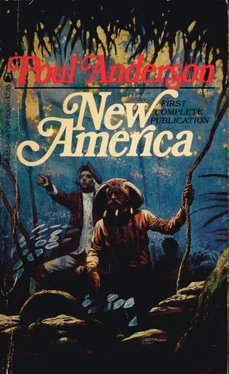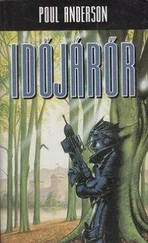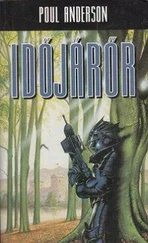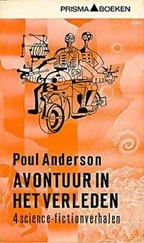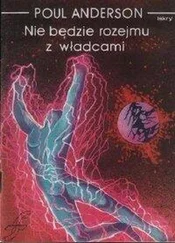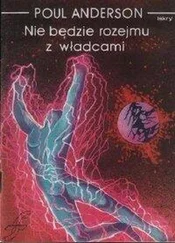“Well,” he said at last, into the wind, “I guess that’s that.”
“You’ll get over it,” said Eva, no louder or livelier than he. “You both will, and be friends when you happen to meet.”
“Except why couldn’t she see—?”
“She could, Dan. That’s precisely the trouble, or the salvation. She sees far too clearly.”
“You mean, because I care about the land, she doesn’t imagine I care about her? No! She’s not that petty.”
“I didn’t say she is, Dan. In fact, she’s very large, > very wise and kind. Look, she can live here, never going outside of cages like a house and a helmet. But to make you stay all your days, or more than a bare fragment of them, where she can be—that’d cage you. You, who now have the whole world before you. Better to say goodbye at once, while you’re still fond of each other.”
And you, Eva, inherit me, he thought in bitterness. He glanced down at her, but her head was averted from him and he saw only flying cinnabar locks.
Wind skirled, thunder cannonaded. He barely heard, after a minute: “That’s what I had to tell Ralph before you arrived. When he asked me to marry him.”
The breath went from Dan. The first stinging drops of rain smote him in the face.
Then she turned back and took both his hands. In her eyes he saw—not a plea, not an invitation— the challenge to make a new beginning.
Nowhere on Rustum was autumn like that season anywhere on Earth. But on the plateau of High America it did recall, a little, the falls and Indian summers of the land whence this one had its name—if only because many plants from another mother planet now grew there. Or so the oldest colonists said. They had become very few. Daniel Coffin knew Earth from books and pictures and a dim star near Bootes, which his foster father had pointed out as Sol.
Red leaves of maple, yellow leaves of birch, gold-streaked scarlet leaves of gim tree, scrit-tled on the wind, while overhead tossed the blue featheriness of plume oak that does not shed for winter. The founders of Anchor were forethoughtful men and women, who laid out broad streets lined with saplings when they were huddling in tents or sod huts. The timber grew with the town. In summer it gave shade, today it gave radiance to pavement, to walls of brick and tinted concrete and what frame buildings remained from earlier times, to groundcars and trucks—and an occasional horse-drawn wagon, likewise a souvenir of the pioneers—that bustled along the ways.
Children bound for school dodged in and out among elder pedestrians. Their shouts rang. Coffin remembered the toil and poverty he had lived with, like everyone else, and smiled a bit. Yes, there is such a thing as progress, he thought.
Air flowed and murmured, cool on his face, crisp in his nostrils. The sky arched altogether clear, pale blue, full of southbound wings. Eastward, the early morning sun stood ruddy-orange at the end of street and town, above the snowpeaks of the distant Hercules range. Though Anchor’s hinterland was an entire planet, it was itself not large: about ten thousand permanent residents, more than half of them children. To be sure, this was a fourth of the world’s humanity.
Glancing the opposite way, Coffin saw a tattered drift of smoke above the mostly low roofs. A flaw of wind brought a rotten-egg stench. He scowled. Progress can get overdone . Though he had never seen it in person, writings, films, and the tales of witnesses had driven into his bones what too much population and industry had done to Earth.
And as for children—the cheerfulness of the weather departed. Here was the hospital. His heart knocked and he mounted the steps more slowly than was his wont.
“Good morning, Mr. Coffin.” The nurse on desk duty was quite young. She addressed him with an awe which hitherto he had found wryly amusing. Him, plain Dan Coffin, lowland farmer?
Well, of course he’d made a name for himself as a young man, one of the few who could explore the immensities down yonder and gain the knowledge of Rustum that all men must have. And, yes, he’d had experiences that made sensational stories. But he’d always winced at those, recollecting the ancient saying that adventure happens only to the incompetent—then excusing himself with the fact that in so much unknownness, it was impossible to foresee every working of Murphy’s Law.
And anyhow, that was long behind him. He’d been settled down at Lake Moondance for—was it thirty-five years? ( Which’d be about twenty Terrestrial, said an echo from his childhood, when people were still trying to keep up traditions like Christmas.) Oh yes, he did have by far the biggest plantation in those parts, or anywhere in the lowlands. He could be reckoned as well-off. His neighbors for three or four hundred kilometers around considered him a sort of leader, and had informally commissioned him to speak for them in High America. Nevertheless!
“Good morning, Miss Herskowitz,” he said, bowing as was expected in Anchor, where they went in more for mannerly gestures than folk did on the frontier. “Uh, I wonder, I know it’s early but I have an appointment soon and—”
The sudden compassion on her face struck him with terror. “Yes, by all means, Mr. Coffin. Your wife’s awake. Go right on in.”
That gaze followed him as he strode: a stocky, muscular man, roughly clad for his field trip later today, his features broad and weathered, his black hair streaked with gray. He felt it on his back, in his heart.
The door was open to Eva’s room. He closed it behind him. For a moment he stood mute. Against propped-up pillows, sunlight through a window gave her mane back the redness it had had when first they knew each other. She was nursing their baby. On a table stood a vase of roses. He hadn’t brought them, hadn’t even known the town now boasted a conservatory. The hospital staff must have given them. That meant—
She raised her eyes to him. Their green was faded by weariness and (he could tell) recent crying. For the same reason, the freckles stood forth sharply on her snub-nosed countenance. And yet she was making a recovery from childbirth that would have been fast and good in a much younger woman.
“Dan—” He had long had a little trouble hearing, in the High American air that was scarcely thicker than Earth’s. Now he must almost read her lips. “We can’t keep him.”
He clamped his fists. “Oh, no.”
She spoke a bit louder, word by word. “It’s final. They’ve made every clinical test and there is no doubt. If we bring Charlie to the lowlands, he’ll die.”
He slumped on a chair at the bedside and groped for her hand. She didn’t give it to him. Holding the infant close in both arms, she stared at the wall before her and said, flat-voiced: “That was twelve or thirteen hours ago. They tried to get hold of you, but you weren’t to be found.”
“No, I—I had business, urgent business.”
“You’ve had a lot of that, the whole while I was here.”
“Oh, God, darling, don’t I know it!” He barely, lightly grasped her shoulder. His hand shook. “Don’t you know it, too?” he begged. “I’ve explained—”
“Yes. Of course.” She turned to him with the resolution he knew. She even tried to smile, though that failed. “I’ve just… been lonely. I’ve missed you….” Then she could hold out no longer, and she bent her head and wept.
He rose, stooped over her, gathered clumsily to his bosom her and the last child the doctors said she could ever have. “I know half a dozen fine homes that’d be happy to foster him,” he said. “That’s one thing that kept me busy, looking into this matter, in case. We can come see him whenever we want. It’s not like him being dead, is it? And, sure, we’ll adopt an exogene as soon as possible. Sweetheart, we both knew our luck couldn’t hold out forever. Three children of our own that we could keep may actually have bucked the odds. We’ve a lot to be glad of. Really we do.”
Читать дальше
